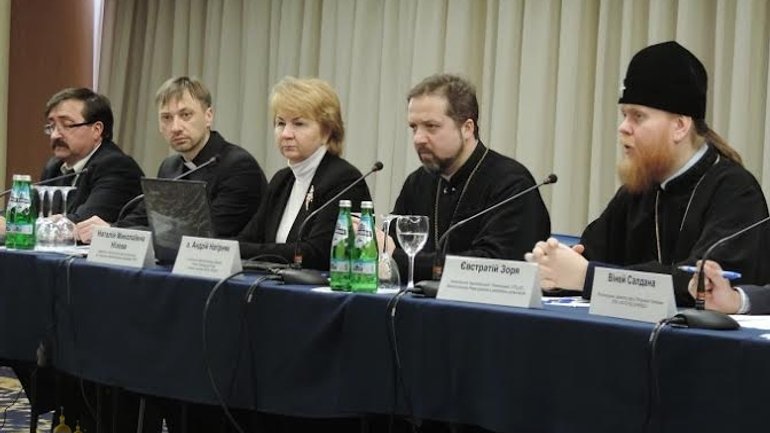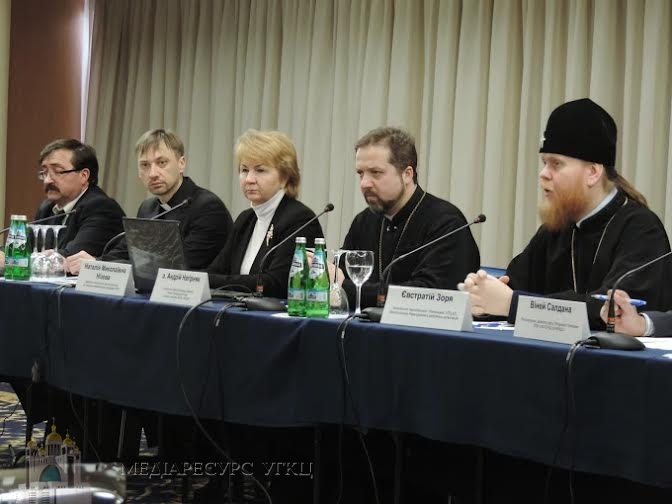Churches and public sector to counteract HIV/AIDS epidemic in Ukraine

 On the World Day of the Sick, February 11,a meeting dedicated to HIV/AIDS prevention was held in Kyiv. It was attended by representatives of different faiths - members of the All-Ukrainian Council of Churches and Religious Organizations (AUCCRO), public sector activists and government agencies representatives.
On the World Day of the Sick, February 11,a meeting dedicated to HIV/AIDS prevention was held in Kyiv. It was attended by representatives of different faiths - members of the All-Ukrainian Council of Churches and Religious Organizations (AUCCRO), public sector activists and government agencies representatives.
According to the Information Department of the UGCC, the meeting was held on the initiative of the Public Council of the Ministry of Health of Ukraine on cooperation with AUCCRO supported by the Joint UN Program on HIV/AIDS (UNAIDS). The purpose of the meeting was discussing the HIV/AIDS epidemic in Ukraine and defining roles and main activities of churches and religious organizations in humanitarian crises.
“We always talk about the importance of socio-medical ministry of religious organizations. Who if not the Church shall support patients and show mercy? Our goal today is overcoming HIV/AIDS in Ukraine and we can help here,” said Archbishop Yevstratiy (Zorya).
Director of the Ukrainian Center for control of socially dangerous diseases to the Ministry of Health of Ukraine Valentyina Nizova also indicated to the need for unity and support in opposing the epidemic: “The more hope and faith invested in the hearts of the people, the sooner we can overcome the challenges we face.”
UNAIDS Regional Director for Eastern Europe and Central Asia Vinay Saldanha said that he was impressed by AUCCRO in Ukraine and believes that this unique experience can be very useful for other countries. Today, more than 35 million people all over the world are infected and require lifelong treatment. Last year 1.5 million people all over the world died from the disease. In this situation it is extremely important to undertake preventive activities and to inform people of a prominent role a religious organization can play. “Of course, we cannot say that the epidemic is under control. However, it is in religious organizations that I see the important contact with people in their service. The ministers and religious leaders can conduct preventive activities by opposing the spread of the epidemic. "
The results of the different denominations by the years of opposing the epidemic were presented by Father Andriy Nahirnyak (Ukrainian Greek-Catholic Church), Chairman of the Public Health Ministry on cooperation with AUCCRO. Active cooperation began in 2007 with the support of UNAIDS in Ukraine. Therefore, on December 10, 2007, AUCCRO approved the interconfessional Concept and Policies to oppose HIV/AIDS epidemic. Thereafter several interfaith events and meetings across the country were held. Since then practical mechanisms of outreach were developed and two collections of materials titled “Participation of the Church and religious organizations in opposing the epidemic and working with people with HIV/AIDS" was released. Numerous training for clergy and volunteers, roundtables promoted this activity area in different denominations.
It is important that the churches in Ukraine received HIV-positive people, said director of legal department of the Ukrainian Network of People Living with HIV (PLHIV) SerhiyDmitriev. So when a person turns to a church minister with sensitive issue, the latter should be prepared to respond and refer him to specialists where he can get help for sure. In the future we plan to have a series of training sessions aimed at raising awareness on these issues.
Father Yevhen Romashyn (UOC), who came from Kharkiv region, spoke on the lack of preventive measures and simple medical examination. He assured that the low number of medical examinations was accounted for not only by lack of equipment, but also by the fact that people are afraid. Father Victor Yatsenko (UOC), who has worked a prison chaplain for many years, agreed with him.
Father Vitaliy Hrabatyn (UGCC) spoke about his six-year experience in hospital chaplaincy. He noted the acute need for service in hospitals at the official level and for private space to work with victims. Therefore, there should be some room to work with patients in hospitals. The Commission on Pastoral Care of the UGCC in Healthcare released in 2014 a collection of materials on pastoral care of people living with HIV/AIDS, which explains practical aspects of support and service.
Deputy Head of the Department of Social Ministry of the UOC-Kyiv Patriarchate Father Serhiy Dmitriev said that there should be cooperation between different religious organizations engaged in prevention activities and in making public service announcements. After the meeting the resolution text was presented.
Note: Now in Ukraine there are almost 264 thousand people living with HIV, and another 75,271 people have AIDS. In 2014 around 19 000 new instances of infection were recorded, but their exact number is unknown because of the lack of medical examination. Thus the main route of infection is sexual (69%), the second place is drug injection (30%). Eastern and southern regions, including Donetsk and Luhansk, remain maximally affected. Much of the HIV-positive people left the ATO area. Among the HIV positive a fewer number of children are born with a positive status. Thus, in 8 regions of the country the level of infections for babies has fallen below 2% and in four regions this problem has been successfully overcome.










